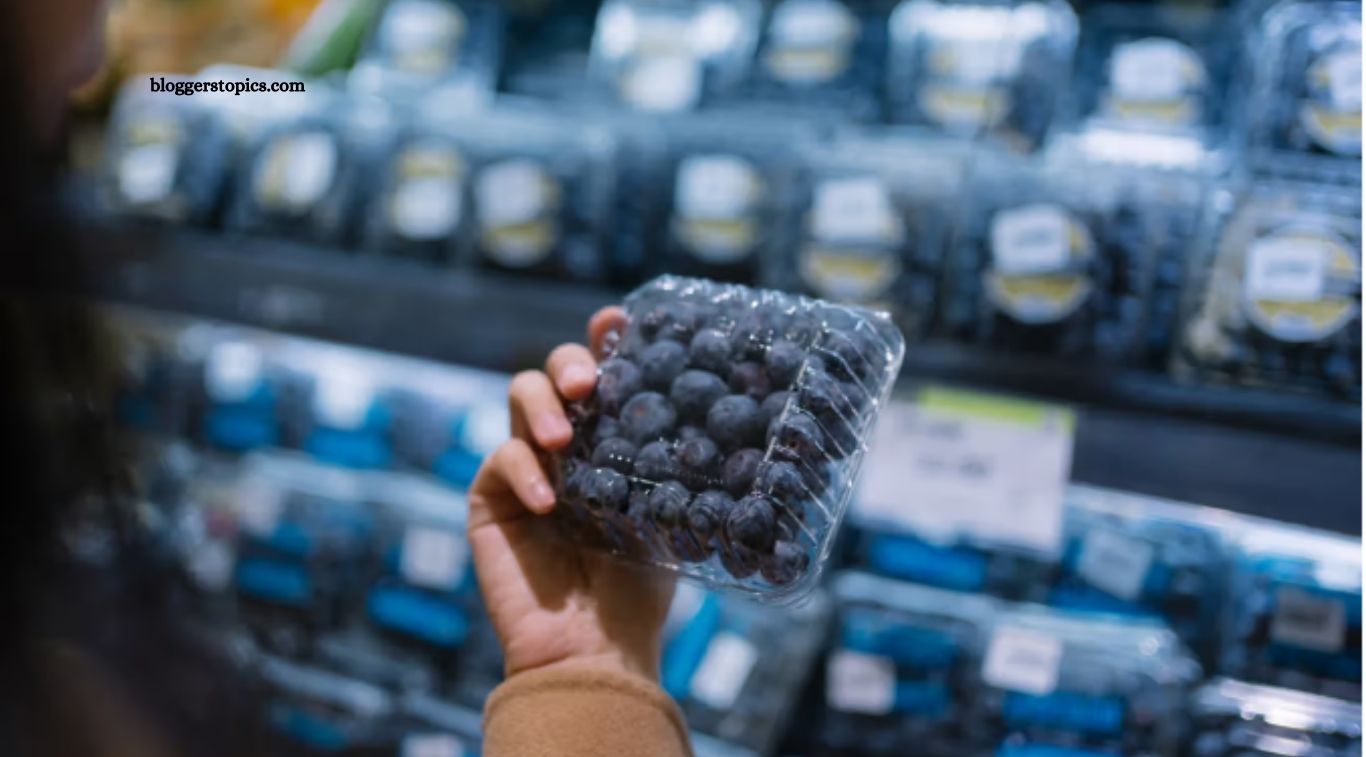The U.S. Food and Drug Administration (FDA) has classified a recent recall of organic blueberries as a Class I risk—the agency’s most serious level—due to potential contamination with Listeria monocytogenes, a harmful foodborne pathogen.
The recall was initiated voluntarily by Alma Pak International LLC, a Georgia-based food manufacturer, after routine testing on June 9 yielded positive results for Listeria in two product lots. A total of 400 boxes, each weighing 30 pounds, were affected. The products, identified by Lot Numbers 13325 G1060 and 13325 G1096, were shipped primarily to a single customer in North Carolina.
Read More:Samsung Galaxy Z Fold 7 Hands-On: Now as Slim and Lightweight as a Standard Smartphone
On July 1, the FDA elevated the recall to Class I status, indicating “a reasonable probability that the use of, or exposure to, a violative product will cause serious adverse health consequences or death.”
Listeria monocytogenes infection can lead to listeriosis, a potentially severe illness, particularly in young children, elderly individuals, pregnant women, and those with weakened immune systems. Prompt medical attention is advised for anyone experiencing symptoms after consuming potentially contaminated food.
Though Healthline was unable to reach Alma Pak for direct comment, the company told Newsweek in a statement that the affected products were “fully recovered prior to reaching the retail market,” and assured the public that “no product was sold to consumers, and there was no risk to public health.”
The company also noted it had implemented enhanced food safety measures in response to the incident. “Alma Pak International has strengthened its already rigorous testing and monitoring protocols,” the statement read. “Additional corrective actions, including intensified vector sampling and expanded environmental monitoring, confirmed the effectiveness of these controls. All follow-up testing returned negative results for Listeria monocytogenes.”
The FDA continues to monitor the situation, though no illnesses have been reported in connection with the recalled product.
What to Know About Listeria
Listeria monocytogenes is a harmful bacterium that can contaminate food and cause a serious foodborne illness known as listeriosis. While some infections may result in only mild discomfort, others can lead to severe or life-threatening complications.
Common Symptoms of Mild Listeria Infection
For most healthy individuals, symptoms appear within a few days of exposure and typically resolve within 1–3 days. These may include:
- Fever
- Nausea and vomiting
- Diarrhea
- Muscle aches
Severe Listeriosis: High-Risk and Serious Symptoms
In more serious cases, especially when the infection spreads beyond the gut, symptoms may escalate to include:
- Headache
- Stiff neck
- Confusion or disorientation
- Loss of balance
- Seizures or convulsions
Who Is Most at Risk?
Severe listeriosis poses the greatest risk to:
- Newborns
- Pregnant individuals (risking miscarriage, stillbirth, or newborn infection)
- Adults over the age of 65
- People with weakened immune systems (e.g., due to cancer, diabetes, HIV, or organ transplants)
When to Seek Medical Attention
If you develop flu-like symptoms or any of the above signs after consuming potentially contaminated food, seek medical care immediately. Early diagnosis and treatment—often involving antibiotics—can significantly reduce the risk of severe complications.
How Listeria Bacteria Grows
While the FDA’s recent high-level risk warning regarding blueberries has raised public concern, experts emphasize that the overall risk to consumers remains low.
“Blueberries are generally safe for consumption. Contamination is rare, and proper food handling significantly reduces the risk,” said Michelle Routhenstein, MS, RD, a registered dietitian specializing in heart disease at Entirely Nourished.
However, Listeria monocytogenes can develop in food products under certain conditions—particularly during processing and packaging.
“Listeria can grow if blueberries come into contact with contaminated water, unclean surfaces, or poorly sanitized equipment during harvesting or packaging,” Routhenstein explained in an interview with Healthline. “It may also thrive if cold chain standards are not maintained or if workers fail to follow proper hygiene protocols.”
Another potential risk is cross-contamination, which occurs when ready-to-eat foods touch surfaces or utensils previously contaminated with Listeria. “For instance, using the same cutting board for raw meat and then for fresh fruit—without thoroughly cleaning it—can transfer the bacteria and increase the risk of illness,” she added.
Listeria is particularly resilient because, unlike many other pathogens, it can continue to grow at refrigeration temperatures. This makes strict sanitation and proper cold storage essential at every step of the supply chain.
How Listeria Bacteria Grows
While the FDA’s recent high-level risk warning regarding blueberries has raised public concern, experts emphasize that the overall risk to consumers remains low.
“Blueberries are generally safe for consumption. Contamination is rare, and proper food handling significantly reduces the risk,” said Michelle Routhenstein, MS, RD, a registered dietitian specializing in heart disease at Entirely Nourished.
However, Listeria monocytogenes can develop in food products under certain conditions—particularly during processing and packaging.
“Listeria can grow if blueberries come into contact with contaminated water, unclean surfaces, or poorly sanitized equipment during harvesting or packaging,” Routhenstein explained in an interview with Healthline. “It may also thrive if cold chain standards are not maintained or if workers fail to follow proper hygiene protocols.”
Another potential risk is cross-contamination, which occurs when ready-to-eat foods touch surfaces or utensils previously contaminated with Listeria. “For instance, using the same cutting board for raw meat and then for fresh fruit—without thoroughly cleaning it—can transfer the bacteria and increase the risk of illness,” she added.
Listeria is particularly resilient because, unlike many other pathogens, it can continue to grow at refrigeration temperatures. This makes strict sanitation and proper cold storage essential at every step of the supply chain.
How to Lower Your Risk of Listeria
While the overall risk of listeria contamination in fresh produce like blueberries is low, practicing safe food handling can significantly reduce the chances of illness.
To help protect yourself and your family, follow these evidence-based precautions:
- Wash Fresh Produce Thoroughly:
Rinse blueberries and other fruits under cool running water before eating, cooking, or preparing them. This helps remove dirt, bacteria, and potential contaminants. - Use a Produce Brush for Firm-Skinned Fruits:
“For fruits with firm skins or rinds—like apples, melons, or cucumbers—use a clean produce brush to scrub the surface,” advised Michelle Routhenstein, MS, RD, a registered dietitian specializing in heart health. - Store Fruits Properly:
Keep fruits refrigerated at 40°F (4°C) or lower, and store them separately from raw meats, poultry, or seafood to prevent cross-contamination. - Practice Good Kitchen Hygiene:
“Clean your hands, kitchen surfaces, cutting boards, and storage containers before and after handling fresh produce,” Routhenstein said. This includes regularly sanitizing countertops and using clean towels or disposable paper towels to dry washed produce. - Eat Fresh Produce Promptly:
Try to consume fresh berries and other fruits within a few days of purchase to reduce the risk of bacterial growth over time.
By following these simple yet effective food safety practices, you can enjoy fresh produce while minimizing your risk of listeria and other foodborne illnesses.
Frequently Asked Questions
What is Listeria?
Listeria monocytogenes is a bacterium that can cause a foodborne illness called listeriosis. It can range from mild flu-like symptoms to severe, life-threatening infections.
How does Listeria contaminate blueberries?
Listeria can contaminate blueberries if they come into contact with contaminated water, unclean equipment, or surfaces during harvesting or packaging. It can also spread through cross-contamination from other foods.
Is the recent blueberry recall a cause for concern?
While the recall and FDA warning are serious, contamination is rare. The affected products were reportedly recovered before reaching consumers, so the risk to the general public remains low.
Who is most at risk from Listeria infection?
Newborns, pregnant people, older adults over 65, and those with weakened immune systems are most vulnerable to severe illness from Listeria.
What symptoms should I watch for after eating potentially contaminated food?
Mild symptoms include fever, nausea, vomiting, diarrhea, and muscle aches. Severe symptoms may include headaches, neck stiffness, confusion, loss of balance, and seizures. Seek medical attention immediately if symptoms occur.
How can I reduce my risk of Listeria contamination?
Wash fruits thoroughly under running water, use a produce brush for firm fruits, store produce separately from raw meats, maintain good kitchen hygiene, and consume fresh produce within a few days.
Can Listeria grow in the refrigerator?
Yes, Listeria is unique because it can grow at refrigeration temperatures, which is why proper handling and cleanliness are essential.
Conclusion
While the recent recall of organic blueberries highlights the seriousness of potential Listeria monocytogenes contamination, it also serves as a reminder of the importance of proper food handling and safety practices. Fortunately, the affected products were contained before reaching the public, and the overall risk remains low.
By staying informed and following simple preventive steps—such as thoroughly washing produce, practicing good kitchen hygiene, and storing food properly—consumers can significantly reduce their risk of foodborne illness.







